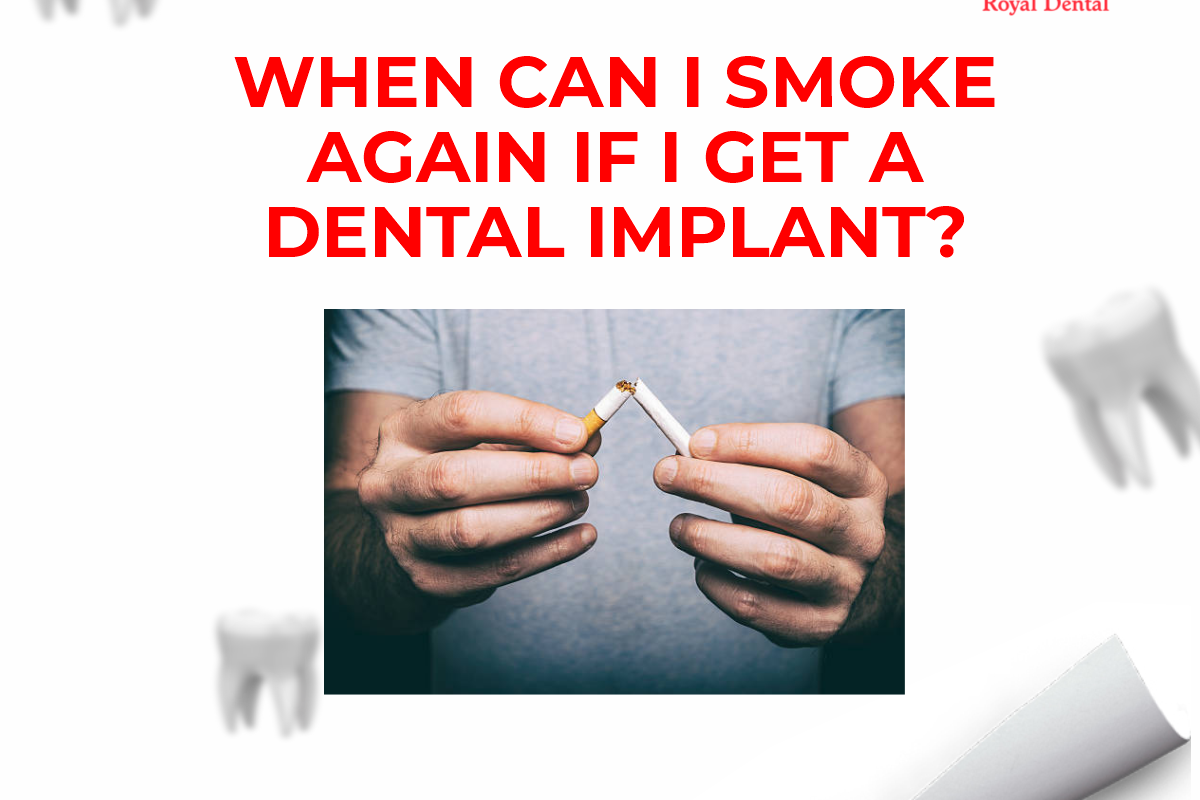Dental implants have become increasingly popular in recent years as a solution to missing teeth. While they are a great option for restoring your smile and improving your oral health, there are certain habits that can affect the success of your implants. One of these habits is smoking. Smoking not only impacts your overall health, but it can also have a negative impact on your dental implants. Research has shown that smokers are at a higher risk of implant failure, as smoking can slow down the healing process and increase the likelihood of infections. So, if you are a smoker considering dental implants, it’s important to understand the potential risks involved. In this article, we’ll explore the science behind how smoking affects the success of dental implants, and what you can do to improve your chances of a successful implant procedure.
How smoking affects oral health?
Before diving into how smoking affects dental implants, it’s important to understand the impact of smoking on oral health in general. Smoking is a leading cause of various oral health problems, including bad breath, stained teeth, gum disease, and oral cancer. The chemicals in tobacco smoke can damage the soft tissue in the mouth, making it easier for bacteria to enter and cause infections. Smoking can also reduce blood flow to the gums, which can slow down the healing process and increase the risk of gum disease.
According to the American Dental Association, smoking is one of the most significant risk factors for gum disease, which is a leading cause of tooth loss in adults. Smokers are more likely to develop periodontal disease, which can cause the gums to pull away from the teeth, leading to bone loss and tooth loss. In addition, smoking can also mask the symptoms of gum disease, making it harder to detect and treat at an early stage.
For Details Read On:
Impact of smoking on Dental Implant success rate
Dental implants are artificial tooth roots that are placed into the jawbone to support a replacement tooth or bridge. They are typically made of titanium, which is a biocompatible material that can fuse with the bone through a process called osseointegration. The success of dental implants depends on various factors, including the patient’s overall health, the quality and quantity of the jawbone, and the skill of the dentist performing the procedure.
Smoking can have a negative impact on all of these factors, making it more difficult for dental implants to succeed. Research has shown that smokers have a higher risk of implant failure compared to non-smokers. In a study published in the Journal of Periodontology, researchers found that smokers had a 15.8% implant failure rate, compared to a 1.4% failure rate for non-smokers.
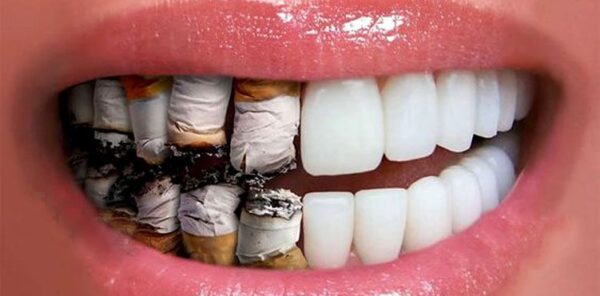
Another study published in the Journal of Dental Research found that smokers had a 2.6 times higher risk of implant failure compared to non-smokers.
The reason for this increased risk is due to the negative effects of smoking on oral health. Smoking can reduce blood flow to the gums and bone, which can slow down the healing process and make it harder for the implant to fuse with the bone. Smoking can also increase the risk of infections, which can further compromise the success of the implant. In addition, smoking can affect the quality and quantity of the bone, which is essential for supporting the implant.
Scientific studies on Smoking and Dental Implant
Several scientific studies have been conducted to assess the impact of smoking on dental implant success rates. In a systematic review published in the International Journal of Oral and Maxillofacial Implants, researchers analyzed 12 studies that evaluated the success of dental implants in smokers and non-smokers. The review found that smokers had a significantly higher risk of implant failure compared to non-smokers, and that the risk increased with the number of cigarettes smoked per day and the duration of smoking.
Another study published in the Journal of Clinical Periodontology assessed the effect of smoking on the bone density and osseointegration of dental implants. The study found that smokers had lower bone density and reduced osseointegration compared to non-smokers, which can compromise the stability and longevity of the implant. Overall, these studies suggest that smoking can have a significant negative impact on the success of dental implants, and that smokers should be aware of these risks before undergoing implant surgery.
Risk of Smoking before and after Dental Implant
Smoking can increase the risk of complications before and after dental implant surgery. Before surgery, smoking can reduce blood flow to the gums and bone, which can slow down the healing process and make it more difficult for the implant to fuse with the bone. Smokers may also be more susceptible to infections, which can further compromise the success of the implant.
After surgery, smoking can delay the healing process and increase the risk of implant failure. In a study published in the Journal of Oral Implantology, researchers found that smokers had a significantly higher risk of implant failure and complications compared to non-smokers. The study also found that smokers had a longer healing time and more postoperative pain compared to non-smokers.
Tips for quitting smoking after Dental Implant
If you are a smoker considering dental implants, it’s important to quit smoking before and after surgery to improve your chances of a successful outcome. Quitting smoking can be challenging, but there are several strategies that can help.
- Talk to your dentist or doctor about smoking cessation programs or medications that can help you quit.
- Set a quit date and inform your family and friends of your decision to quit smoking.
- Avoid triggers that can cause you to smoke, such as alcohol or stress.
- Keep your hands and mouth busy with healthy alternatives, such as chewing gum or snacking on fruits and vegetables.
- Stay active and exercise regularly to reduce cravings and improve your overall health.
Alternative Options for Smokers considering Implants
If you are a smoker and are not ready to quit, there are alternative options to consider for replacing missing teeth. One option is a dental bridge, which is a prosthetic device that is anchored to the remaining teeth and can replace one or more missing teeth. Another option is a partial denture, which is a removable appliance that can replace multiple missing teeth. While these options may not be as durable or long-lasting as dental implants, they can be a good alternative for smokers who are not ready to quit.
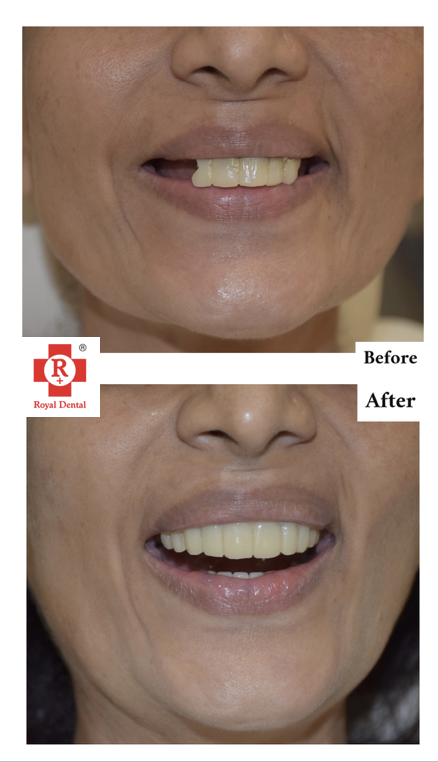
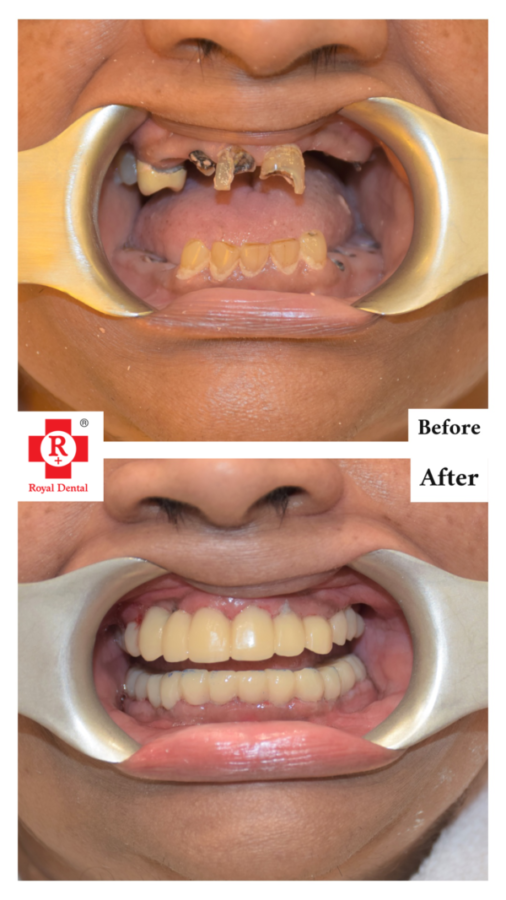
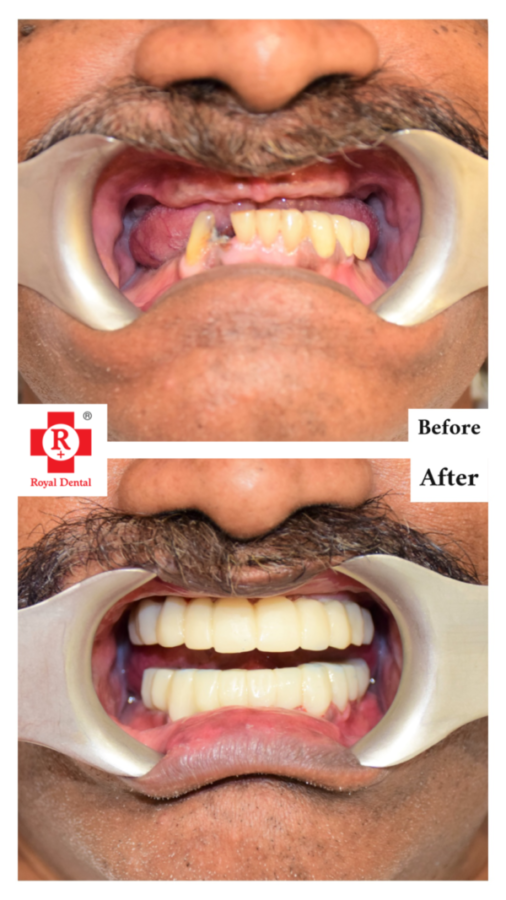
Importance of discussing smoking habits with your dentist
Discussing your smoking habits with your dentist is an important step in maintaining good oral health. Smoking is a known risk factor for many oral health problems, including gum disease, tooth decay, and oral cancer. By discussing your smoking habits with your dentist, you can work together to develop a personalized plan to address any oral health issues that may arise.
Dr. Chirag Chamria at Royal Dental Clinics emphasizes the importance of discussing smoking habits with your dentist. During a dental checkup, Dr. Chamria will ask about your smoking history and assess the health of your gums and teeth. If you are a smoker, he will discuss the risks associated with smoking and how it can impact your oral health.
Quitting smoking is one of the best things you can do for your oral and overall health. If you are a smoker, Dr. Chamria can provide guidance and support to help you quit. By quitting smoking and maintaining good oral hygiene habits, you can reduce your risk of oral health problems and improve your overall health and wellbeing.
Remember, your dentist is there to help you maintain good oral health. By discussing your smoking habits with your dentist, you can work together to develop a plan to keep your teeth and gums healthy for years to come.
Frequently Asked Questions: Smoking and Implants
Q: Can I smoke after dental implant surgery?
A: It’s recommended to avoid smoking after dental implant surgery to improve the chances of a successful outcome. Smoking can delay the healing process and increase the risk of implant failure and complications.
Q: How long should I quit smoking before dental implant surgery?
A: It’s recommended to quit smoking at least 2 weeks before dental implant surgery to reduce the risk of complications and improve the chances of a successful outcome.
Q: Can smoking affect the quality and quantity of the bone?
A: Yes, smoking can affect the quality and quantity of the bone, which is essential for supporting the implant. Smoking can also reduce blood flow to the bone, which can slow down the healing process and make it more difficult for the implant to fuse with the bone.
Q: What are the alternative options for smokers considering dental implants?
A: Alternative options for smokers considering dental implants include dental bridges and partial dentures, which may be a good alternative for smokers who are not ready to quit.
Q: How can I quit smoking before and after dental implant surgery?
A: Quitting smoking can be challenging, but there are several strategies that can help, such as talking to your dentist or doctor about smoking cessation programs or medications, avoiding triggers that can cause you to smoke, and staying active and exercising regularly.
Conclusion
In conclusion, smoking can have a significant negative impact on the success of dental implants. Smokers are at a higher risk of implant failure and complications, and may experience a longer healing time and more postoperative pain compared to non-smokers. Quitting smoking before and after surgery can improve your chances of a successful outcome, and alternative options such as dental bridges or partial dentures may be considered for smokers who are not ready to quit. It’s important to discuss your smoking habits with your dentist and to take steps to improve your oral and overall health.

